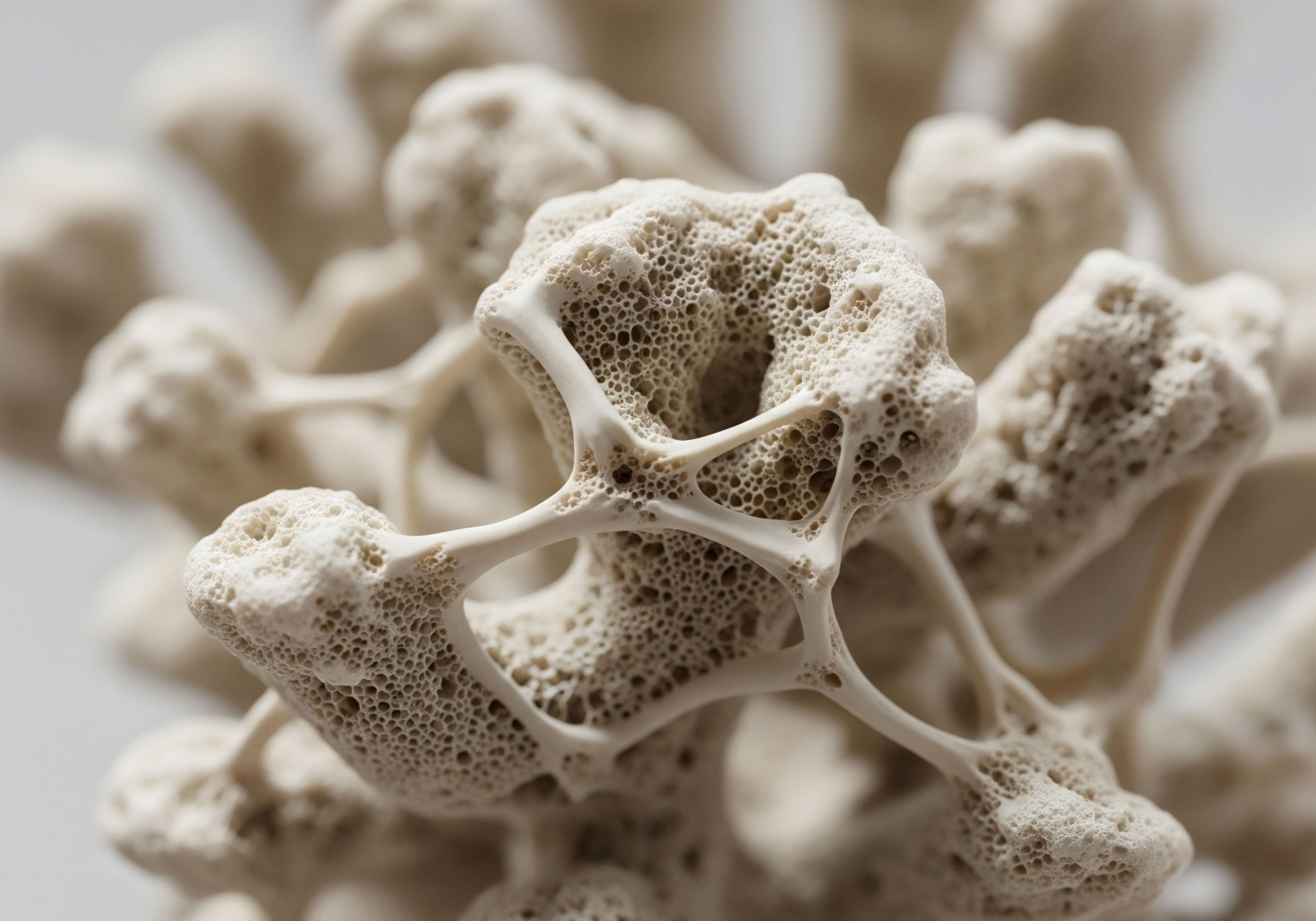

Fundamentals
You feel it as a subtle shift, a gradual dimming of the vibrant energy that once defined your days. It might manifest as a persistent fatigue that sleep no longer remedies, a frustrating plateau in your fitness goals despite your consistent efforts, or a mental fog that clouds your focus.
These experiences are not mere consequences of aging; they are signals from your body’s intricate communication network, the endocrine system. At the heart of this system are hormones and their corresponding receptors, a sophisticated lock-and-key mechanism that governs everything from your metabolism to your mood.
When this system functions optimally, the communication is seamless, and you feel vital, resilient, and fully alive. However, when the receptors become less responsive, it is as if the locks have become rusty, and the hormonal keys can no longer effectively transmit their messages. This state, known as hormone receptor insensitivity, is a primary driver of the symptoms that so many adults silently endure, attributing them to the inevitable passage of time.
The journey to reclaiming your vitality begins with a deeper understanding of these cellular dialogues. Your hormone receptors are not static; they are dynamic structures that are profoundly influenced by your daily choices.
The food you eat, the way you move your body, the quality of your sleep, and the manner in which you navigate stress all have a direct impact on the sensitivity of these receptors. This is a powerful realization, as it shifts the focus from a sense of passive endurance to one of active empowerment.
You possess the ability to directly influence your body’s hormonal symphony, to polish the rusty locks and restore the clarity of communication within your endocrine system. This process is not about resorting to extreme measures or adopting unsustainable protocols.
It is about making a series of conscious, evidence-based lifestyle interventions that work in concert to enhance your body’s innate intelligence. By learning to listen to the signals your body is sending and responding with targeted, supportive actions, you can initiate a profound transformation in your hormonal health and overall well-being.

The Cellular Dialogue Hormones and Receptors
To fully appreciate the impact of lifestyle interventions, it is essential to visualize the intricate dance that occurs at the cellular level. Hormones, the chemical messengers of the body, are produced by various glands and travel through the bloodstream to their target cells.
On the surface of these cells are receptors, specialized proteins that are uniquely shaped to bind with specific hormones. When a hormone binds to its receptor, it triggers a cascade of events within the cell, much like a key turning in a lock initiates a specific action. This process is fundamental to countless physiological functions, including:
- Metabolism ∞ Insulin, a key metabolic hormone, binds to its receptors on cells to facilitate the uptake of glucose from the bloodstream for energy.
- Growth and Repair ∞ Growth hormone and testosterone bind to their receptors in muscle and bone tissue to stimulate growth and repair.
- Mood and Cognitive Function ∞ Hormones such as estrogen and testosterone have receptors in the brain that influence neurotransmitter activity, affecting mood, memory, and cognitive function.
The sensitivity of these receptors determines how effectively a hormone can exert its influence. High sensitivity means that even a small amount of hormone can elicit a strong response, while low sensitivity, or resistance, means that more hormone is required to achieve the same effect.
Over time, chronic overstimulation of receptors can lead to a decrease in their sensitivity, a protective mechanism by which the body attempts to downregulate the hormonal signal. This is the underlying mechanism of conditions such as insulin resistance, a precursor to type 2 diabetes, and it is a central factor in the age-related decline in hormonal function.
Your daily habits directly influence the sensitivity of your hormone receptors, shaping your overall health and vitality.

What Influences Receptor Sensitivity?
The sensitivity of your hormone receptors is not predetermined; it is a dynamic state that is constantly being modulated by a variety of factors. Understanding these influences is the first step toward taking control of your hormonal health. Some of the key factors that impact receptor sensitivity include:
- Diet ∞ A diet high in processed foods, sugar, and unhealthy fats can contribute to inflammation and oxidative stress, both of which can impair receptor function. Conversely, a diet rich in whole foods, lean proteins, healthy fats, and fiber can enhance receptor sensitivity.
- Exercise ∞ Regular physical activity has been shown to increase the number and sensitivity of hormone receptors, particularly for insulin and testosterone.
- Sleep ∞ Chronic sleep deprivation can disrupt the normal circadian rhythm of hormone release and decrease receptor sensitivity.
- Stress ∞ Prolonged exposure to stress and the associated high levels of cortisol can lead to receptor desensitization for a variety of hormones.
By addressing these lifestyle factors, you can create an internal environment that is conducive to optimal hormone receptor function. This is the foundation of a proactive and personalized approach to wellness, one that empowers you to work with your body’s natural processes to achieve a state of vibrant health and well-being.


Intermediate
Having established the foundational understanding of the hormone-receptor relationship, we can now explore the specific, clinically validated lifestyle interventions that can be employed to enhance receptor sensitivity. This is where the abstract concepts of cellular communication translate into actionable protocols that can be integrated into your daily life.
The goal is to move beyond generic wellness advice and delve into the nuanced strategies that have been shown to elicit measurable improvements in hormonal function. This requires a more sophisticated understanding of the underlying biological mechanisms and a willingness to adopt a data-driven approach to your health. By systematically implementing and monitoring the effects of these interventions, you can begin to recalibrate your endocrine system and restore the delicate balance that is essential for optimal health.
The interventions discussed in this section are not isolated tactics but rather interconnected components of a comprehensive wellness strategy. They work synergistically to create a physiological environment that is conducive to enhanced receptor sensitivity.
For example, a diet that is optimized for hormonal health will not only provide the necessary building blocks for receptor synthesis but will also reduce the inflammation that can interfere with receptor function. Similarly, a well-designed exercise program will not only increase receptor sensitivity directly but will also improve sleep quality and stress resilience, further supporting hormonal balance.
This integrated approach is the key to achieving sustainable, long-term results. It is about creating a lifestyle that is not only supportive of your hormonal health but also enjoyable and fulfilling, a lifestyle that you can embrace as a lifelong journey of self-discovery and optimization.

Dietary Protocols for Enhanced Receptor Function
The food you consume has a profound and immediate impact on your hormonal health. A diet that is designed to enhance receptor sensitivity is one that is rich in nutrients, low in inflammatory triggers, and supportive of a healthy gut microbiome. Here are some of the key dietary protocols that have been shown to be effective:
- Omega-3 Fatty Acid Supplementation ∞ Omega-3 fatty acids, found in fatty fish, flaxseeds, and walnuts, are integral components of cell membranes and have been shown to improve the fluidity and function of hormone receptors. They also have potent anti-inflammatory properties, which can help to mitigate the damaging effects of chronic inflammation on receptor sensitivity.
- High-Fiber Diet ∞ A diet rich in fiber, particularly soluble fiber from sources such as oats, barley, and legumes, can improve insulin sensitivity by slowing the absorption of glucose and reducing the post-meal insulin spike. Fiber also plays a crucial role in gut health, supporting the growth of beneficial bacteria that produce short-chain fatty acids, which have been shown to have a positive impact on hormone regulation.
- Adequate Protein Intake ∞ Consuming an adequate amount of high-quality protein is essential for the synthesis of both hormones and their receptors. Protein also helps to stabilize blood sugar levels, which can further improve insulin sensitivity.
Strategic nutritional choices can directly enhance the communication between your hormones and their cellular targets.

The Role of Exercise in Receptor Modulation
Exercise is one of the most powerful tools at your disposal for improving hormone receptor sensitivity. Different types of exercise have distinct effects on the endocrine system, and a well-rounded program will incorporate a variety of modalities to maximize the benefits. Here is a breakdown of the most effective types of exercise for receptor modulation:
| Exercise Type | Primary Hormonal Effects | Recommended Frequency |
|---|---|---|
| Resistance Training | Increases testosterone and growth hormone receptor sensitivity, improves insulin sensitivity. | 2-3 times per week |
| High-Intensity Interval Training (HIIT) | Significantly improves insulin sensitivity, boosts growth hormone production. | 1-2 times per week |
| Aerobic Exercise | Improves insulin sensitivity, reduces cortisol levels. | 3-5 times per week |
It is important to note that while exercise is beneficial, overtraining can have the opposite effect, leading to chronically elevated cortisol levels and a decrease in receptor sensitivity. Therefore, it is crucial to listen to your body and incorporate adequate rest and recovery into your training schedule.

Stress Management and Sleep Optimization
Chronic stress and inadequate sleep are two of the most significant disruptors of hormonal balance. When you are under stress, your body produces high levels of cortisol, which can lead to desensitization of a variety of hormone receptors. Similarly, a lack of quality sleep can disrupt the circadian rhythm of hormone release and impair receptor function. Here are some effective strategies for managing stress and optimizing sleep:
- Mindfulness and Meditation ∞ Regular practice of mindfulness and meditation has been shown to reduce cortisol levels and improve the body’s resilience to stress.
- Consistent Sleep Schedule ∞ Going to bed and waking up at the same time each day, even on weekends, can help to regulate your body’s internal clock and improve the quality of your sleep.
- Sleep Hygiene ∞ Creating a sleep-conducive environment by keeping your bedroom dark, quiet, and cool, and avoiding screens before bed can significantly improve your sleep quality.
By implementing these lifestyle interventions in a consistent and systematic manner, you can create a powerful and lasting positive impact on your hormone receptor sensitivity and overall health. The key is to approach this process with a sense of curiosity and self-compassion, recognizing that you are on a journey of discovery and optimization that will unfold over time.


Academic
At the most granular level, the modulation of hormone receptor sensitivity is a complex interplay of intracellular signaling cascades, gene expression, and epigenetic modifications. A comprehensive understanding of these mechanisms is essential for the development of targeted and effective therapeutic interventions.
This requires a deep dive into the molecular biology of receptor function and a systems-based perspective that appreciates the interconnectedness of the various physiological pathways involved. The lifestyle interventions discussed previously are not simply palliative measures; they exert their effects by directly influencing these intricate cellular processes. By examining the scientific literature, we can begin to elucidate the precise mechanisms by which these interventions translate into tangible improvements in hormonal health.
The academic exploration of hormone receptor sensitivity is a rapidly evolving field, with new discoveries constantly refining our understanding of this critical aspect of human physiology. One of the most promising areas of research is the role of the gut microbiome in hormone regulation.
The trillions of microorganisms that reside in our digestive tract are now understood to be a key player in the endocrine system, producing a wide array of metabolites that can directly influence hormone synthesis, metabolism, and receptor function.
This has opened up new avenues for therapeutic intervention, with a focus on modulating the gut microbiome through diet, probiotics, and other targeted strategies. As our understanding of this complex ecosystem continues to grow, we are likely to see the development of increasingly sophisticated and personalized approaches to hormonal optimization.

The Molecular Mechanisms of Receptor Modulation
The sensitivity of a hormone receptor is not a fixed property but is rather a dynamic state that is subject to a variety of regulatory mechanisms. These mechanisms can be broadly categorized as follows:
- Receptor Downregulation ∞ Prolonged exposure to high concentrations of a hormone can lead to a decrease in the number of receptors on the cell surface, a process known as downregulation. This is a protective mechanism that prevents overstimulation of the cell.
- Receptor Upregulation ∞ Conversely, a chronic deficiency of a hormone can lead to an increase in the number of receptors, a process known as upregulation. This makes the cell more sensitive to the available hormone.
- Post-Translational Modifications ∞ The function of a receptor can be modulated by a variety of post-translational modifications, such as phosphorylation, which can alter its binding affinity for the hormone or its ability to initiate intracellular signaling.
These regulatory mechanisms are influenced by a variety of factors, including diet, exercise, and stress. For example, the omega-3 fatty acid DHA has been shown to inhibit estrogen action in breast cancer cells by inducing degradation of the estrogen receptor. This is a powerful example of how a specific dietary component can directly influence receptor function at the molecular level.
Understanding the molecular intricacies of receptor function is key to developing personalized and effective wellness protocols.

The Gut-Hormone Axis a New Frontier
The gut microbiome is increasingly being recognized as a critical regulator of hormonal health. The bacteria in our gut produce a wide range of metabolites that can influence hormone synthesis, metabolism, and receptor function. For example, certain gut bacteria can produce short-chain fatty acids, such as butyrate, which have been shown to improve insulin sensitivity.
The gut microbiome also plays a key role in the metabolism of estrogen, with certain bacteria producing enzymes that can deconjugate estrogen, allowing it to be reabsorbed into the bloodstream. This has led to the concept of the “estrobolome,” the collection of gut bacteria that are capable of metabolizing estrogens. An imbalance in the estrobolome can lead to either a deficiency or an excess of estrogen, both of which can have significant health consequences.
| Bacterial Metabolite | Hormonal Effect | Dietary Influence |
|---|---|---|
| Short-Chain Fatty Acids (e.g. butyrate) | Improves insulin sensitivity | High-fiber diet |
| Secondary Bile Acids | Modulates thyroid hormone and glucocorticoid signaling | Diet high in healthy fats |
| Indole-3-propionic acid | Reduces inflammation and oxidative stress | Diet rich in tryptophan (e.g. turkey, eggs) |
These are just a few examples of the intricate ways in which the gut microbiome influences hormonal health. As research in this area continues to expand, we are likely to uncover even more connections between our gut bacteria and our endocrine system. This underscores the importance of a holistic approach to hormonal health, one that recognizes the critical role of the gut microbiome and incorporates strategies to support its diversity and function.

References
- Romero-Zerbo, S. Y. & Bermudez-Silva, F. J. (2014). Cannabinoids, eating behaviour, and energy homeostasis. Drug testing and analysis, 6 (1-2), 52 ∞ 58.
- de Lorgeril, M. Salen, P. Martin, J. L. Monjaud, I. Delaye, J. & Mamelle, N. (1999). Mediterranean diet, traditional risk factors, and the rate of cardiovascular complications after myocardial infarction ∞ final report of the Lyon Diet Heart Study. Circulation, 99 (6), 779 ∞ 785.
- Hu, F. B. Manson, J. E. Stampfer, M. J. Colditz, G. Liu, S. Solomon, C. G. & Willett, W. C. (2001). Diet, lifestyle, and the risk of type 2 diabetes mellitus in women. The New England journal of medicine, 345 (11), 790 ∞ 797.
- Volek, J. S. Sharman, M. J. & Forsythe, C. E. (2005). Modification of lipoproteins by very low-carbohydrate diets. The Journal of nutrition, 135 (6), 1339 ∞ 1342.
- Lu, Y. Chen, H. & Li, H. (2019). The role of the gut microbiota in the effect of dietary components on metabolic health. Nutrients, 11 (11), 2711.

Reflection
The knowledge you have gained is the first step on a path of profound self-discovery. The journey to hormonal balance is a deeply personal one, a continuous dialogue between you and your body. As you begin to implement these lifestyle interventions, pay close attention to the subtle shifts in your energy, your mood, and your overall sense of well-being.
This is not about achieving a state of perfection but rather about cultivating a deeper connection with your own physiology, a more nuanced understanding of what your body needs to thrive. The power to reclaim your vitality lies within you, in the conscious choices you make each day. Embrace this journey with curiosity, patience, and a profound respect for the intricate wisdom of your own body.



